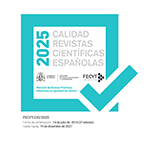A Whole Mind, an Unconquered Eye: Self-Reliance and Freedom in Henry James’s Daisy Miller
Abstract
Looking at Henry James’s literary contexts can fruitfully help shed light on his work. Brilliantly versed in the literary traditions of his time, he was influenced by American, English, French and Russian writers. This article traces the influence of Emerson’s notions of freedom, natural spontaneity, innocence and self-confidence as expressed in his essays “Nature” (1836) and “Self-Reliance” (1841) in Daisy Miller (1878), whilst it investigates the ways James’s novella articulates the all-important dichotomy of self-sufficiency (individual freedom, autonomy, innocence) vs. social conformity (fear, heteronomy, hypocrisy) at play in the narrative. Daisy is the female embodiment of self-reliance as conceptualised in Emerson’s homonymous essay – a free, innocent, uncultivated, wild, and unsophisticated spirit – and so she is never afraid. Epistemology turns out to be central to the conception of the novella, as Winterbourne and the American matriarchs are shown struggling to grasp the protagonist’s puzzling innocence and true nature. As Daisy is a wild being living in accord with Nature as conceived by Emerson, the novella is punctuated by critical moments where the heroine is most at home when enmeshed in the green world, particularly in the outdoor scenes in the Château de Chillon in the Swiss Alps, the Palaces of the Caesars, the Colosseum and the Protestant cemetery in Rome.
Downloads
Article download
License
In order to support the global exchange of knowledge, the journal Complutense Journal of English Studies is allowing unrestricted access to its content as from its publication in this electronic edition, and as such it is an open-access journal. The originals published in this journal are the property of the Complutense University of Madrid and any reproduction thereof in full or in part must cite the source. All content is distributed under a Creative Commons Attribution 4.0 use and distribution licence (CC BY 4.0). This circumstance must be expressly stated in these terms where necessary. You can view the summary and the complete legal text of the licence.









